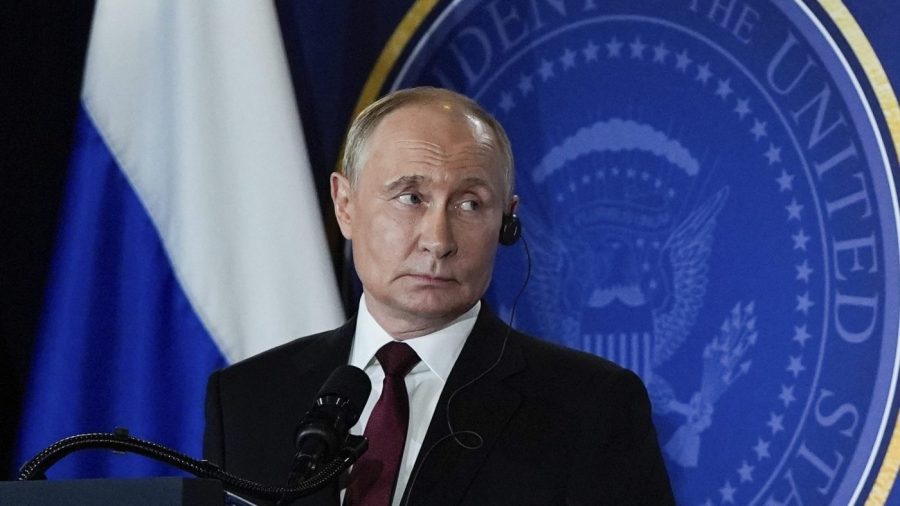
News
August 27, 2025
5 reasons Putin will never end his war in Ukraine
If Trump truly wants a Nobel by bringing peace to Ukraine and Russia, he will have to address the primary “root cause” of the war: Putin.
## 5 Reasons Putin Will Never End His War in Ukraine
The ongoing conflict in Ukraine has sparked countless discussions about potential resolutions and the possibility of peace. While many world leaders and organizations are striving for a diplomatic solution, the reality on the ground suggests a grim outlook. The key obstacle to peace, as many experts believe, lies with Russian President Vladimir Putin and his unwavering commitment to his objectives in Ukraine. If figures like former President Trump genuinely aspire to broker a lasting peace and earn a Nobel Prize in the process, they must first confront the fundamental reasons behind Putin's determination to continue the war.
Understanding Putin's motivations is crucial to comprehending the seemingly intractable nature of the conflict. One major factor is likely Putin's deeply held belief in **historical revisionism**. He views Ukraine as an integral part of Russia, denying its independent identity and sovereignty. This conviction fuels his desire to reclaim what he perceives as rightfully belonging to Russia.
Secondly, **geopolitical strategy** plays a significant role. Putin sees Ukraine's potential alignment with the West, particularly NATO, as a direct threat to Russia's security and influence in the region. Maintaining control over Ukraine, or at least preventing its Western integration, is therefore paramount to his strategic goals.
A third reason is the **preservation of Putin's power**. Ending the war without achieving his stated objectives could significantly weaken his authority and potentially trigger instability within Russia. The war has become intertwined with his personal image and leadership, making a retreat a risky political move.
Furthermore, **domestic propaganda** has created a narrative within Russia that justifies the war and portrays Ukraine as a hostile entity. This manufactured reality makes it difficult for Putin to back down without facing significant public backlash. He has cultivated a strong base of support that believes in the necessity of the "special military operation."
Finally, the **perceived success of initial gains** in certain regions of Ukraine may embolden Putin to continue the war, hoping to secure further territorial advantages. While the war has faced significant setbacks, the control over areas like Crimea and parts of the Donbas region likely reinforces his determination to achieve more.
In conclusion, achieving peace in Ukraine requires addressing these core motivations driving Putin's actions. Without tackling these underlying issues, any attempt at negotiation is likely to be futile. It is these "root causes" that anyone hoping to bring an end to the war, and potentially be recognized for it, must confront head-on.
The ongoing conflict in Ukraine has sparked countless discussions about potential resolutions and the possibility of peace. While many world leaders and organizations are striving for a diplomatic solution, the reality on the ground suggests a grim outlook. The key obstacle to peace, as many experts believe, lies with Russian President Vladimir Putin and his unwavering commitment to his objectives in Ukraine. If figures like former President Trump genuinely aspire to broker a lasting peace and earn a Nobel Prize in the process, they must first confront the fundamental reasons behind Putin's determination to continue the war.
Understanding Putin's motivations is crucial to comprehending the seemingly intractable nature of the conflict. One major factor is likely Putin's deeply held belief in **historical revisionism**. He views Ukraine as an integral part of Russia, denying its independent identity and sovereignty. This conviction fuels his desire to reclaim what he perceives as rightfully belonging to Russia.
Secondly, **geopolitical strategy** plays a significant role. Putin sees Ukraine's potential alignment with the West, particularly NATO, as a direct threat to Russia's security and influence in the region. Maintaining control over Ukraine, or at least preventing its Western integration, is therefore paramount to his strategic goals.
A third reason is the **preservation of Putin's power**. Ending the war without achieving his stated objectives could significantly weaken his authority and potentially trigger instability within Russia. The war has become intertwined with his personal image and leadership, making a retreat a risky political move.
Furthermore, **domestic propaganda** has created a narrative within Russia that justifies the war and portrays Ukraine as a hostile entity. This manufactured reality makes it difficult for Putin to back down without facing significant public backlash. He has cultivated a strong base of support that believes in the necessity of the "special military operation."
Finally, the **perceived success of initial gains** in certain regions of Ukraine may embolden Putin to continue the war, hoping to secure further territorial advantages. While the war has faced significant setbacks, the control over areas like Crimea and parts of the Donbas region likely reinforces his determination to achieve more.
In conclusion, achieving peace in Ukraine requires addressing these core motivations driving Putin's actions. Without tackling these underlying issues, any attempt at negotiation is likely to be futile. It is these "root causes" that anyone hoping to bring an end to the war, and potentially be recognized for it, must confront head-on.
Category:
World